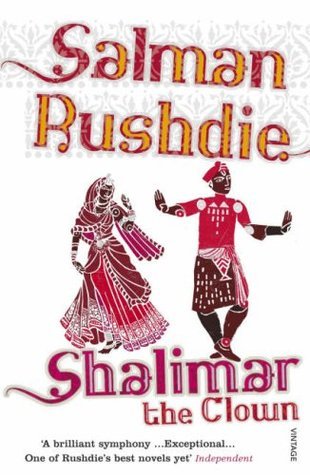Shalimar: The Clown

Rating: 4.2/5
Author: Salman Rushdie
Publisher: Jonathan Cape
Publishing Date: 6 September 2005
Language: English
Genre: Psychological Fiction
ISBN-10: 0099421887
ISBN-13: 978-0099421887
Format: Paperback
Pages: 416
Cost: Rs. 545 (Paperback), Rs. 1299 (Hardcover), Rs. 327.60 (Kindle Edition)
Plot:
Shalimar: The Clown was once a figure full of love and laughter. His skill as a tightrope walker was legendary in his native home of Kashmir. But fate has played him cruelly, torn him away from his beloved home and brought him to Los Angeles, where he works as a chauffeur. One morning he gets up, goes to work and brutally slays his employer, America's former counter-terrorist chief Maximilian Ophuls. This happens in full view of the victim's illegitimate daughter, India. Despite the political overtones, it soon emerges that this is a murder with a much darker heart to it.
The killing has its roots halfway across the globe, back in Kashmir, a ruined paradise. And gradually it emerges that beyond this unholy trinity of Max, India and Shalimar, lurks a fourth figure: the one who binds them all together.
Review:
It is an epic narrative that moves from California to Kashmir, France, and England, and back to California again. Along the way there are tales of princesses lured from their homes by demons, legends of kings forced to defend their kingdoms against evil.
Shalimar: The Clown is a effective allegory constituting both: amenable and reluctant- alternating design of multiculturalism. The plot has equal-parts amalgamation of dark comedy and high level politics and takes place between Los Angeles and Kashmir.
Rushdie has the ability to bring his fictional characters and the situations they are in- to life. In order to do so, he inserts much powerful and well thought out details. For example, in the first few pages the heroine, India Ophuls meets up with her father, the powerful ambassador Max Ophuls, "He was the high priest of the golden bough.”
Another example is, when she looks into the eyes of her father's new driver, Shalimar: "He came, he said in halting reply to her enquiry, from Kashmir. Her heart leapt. A driver from paradise. His hair was a mountain stream. There were narcissi from the banks of rushing rivers and peonies from the high meadows growing on his chest... "
Shalimar: The Clown derives its name from Shalimar Gardens, in the vicinity of Srinagar. Srinagar is one of several Mughal Gardens, which were laid out in several parts of South Asian under Mughal rule. Shalimar is also the name of one of the characters featured in the novel.
The book is filled with immeasurable vocabulary, usage of magical realism/dreams/fantasies and convincing character descriptions. There is plenty of pathos involved and the story is unbearably downhearted.
Milestones of the Book:
- The book was the Man Booker Prize Nominee for Longlist in 2005.
- Shalimar the Clown won the 2005 Vodafone Crossword Book Award.
- It was one of the finalists for the 2005 Whitbread Book Awards.
Adaptations:
The novel was adapted as an opera, with music by Jack Perla and a libretto by Rajiv Joseph, which premiered at Opera theatre of St. Louis in 2016. The performance was conducted by Jayce Ogran. A recording of the opera was subsequently released by Albany Records.
About the Author:
Of Indian origin, Sir Ahmad Salman Rushdie born on 18 June 1947, is one of the best living writers in English. Combining historical fiction with magical realism, Rushdie has been courting controversy ever since Midnight's Children was published in 1981. It won the Booker Prize for Fiction, the James Tait Black Memorial Prize (for fiction), an Arts Council Writers' Award and the English-Speaking Union Award and in 1993 was judged to have been the 'Booker of Bookers': the best novel to have won the Booker Prize for Fiction in the award's 25-year history. Rushdie's third novel, Shame (1983), which many critics saw as an allegory of the political situation in Pakistan, won the Prix du Meilleur Livre Etranger and was shortlisted for the Booker Prize for Fiction. The Satanic Verses, his fourth novel published in 1988, was banned in India and many Islamic countries. Facing death threats the author was granted protection in England.
He moved to USA in 2000, where he currently lives. Salman Rushdie is Honorary Professor in the Humanities at the Massachusetts Institute of Technology (MIT), and Fellow of the Royal Society of Literature. He was made Distinguished Fellow in Literature at the University of East Anglia in 1995. He was awarded the Austrian State Prize for European Literature in 1993 and the Aristeion Literary Prize in 1996, and has received eight honorary doctorates.















































